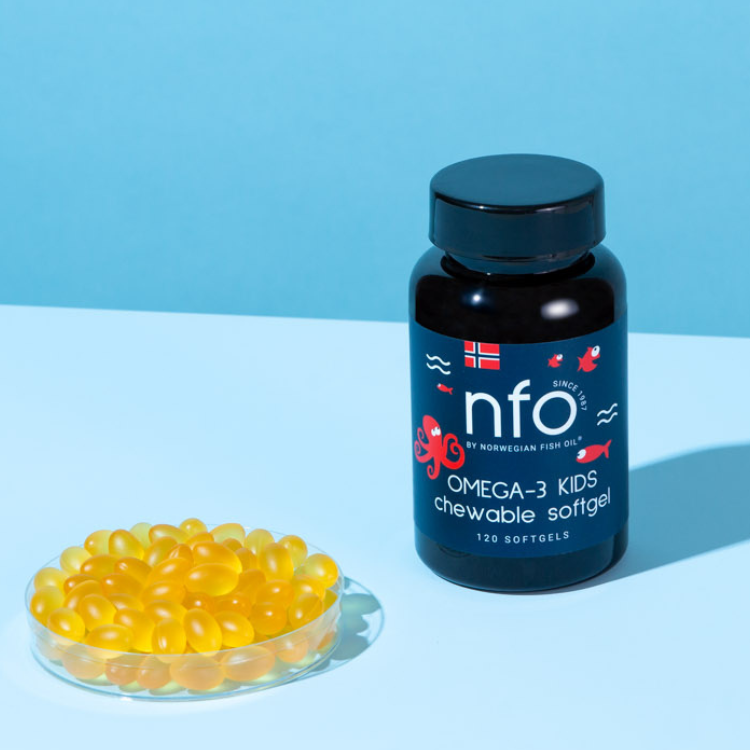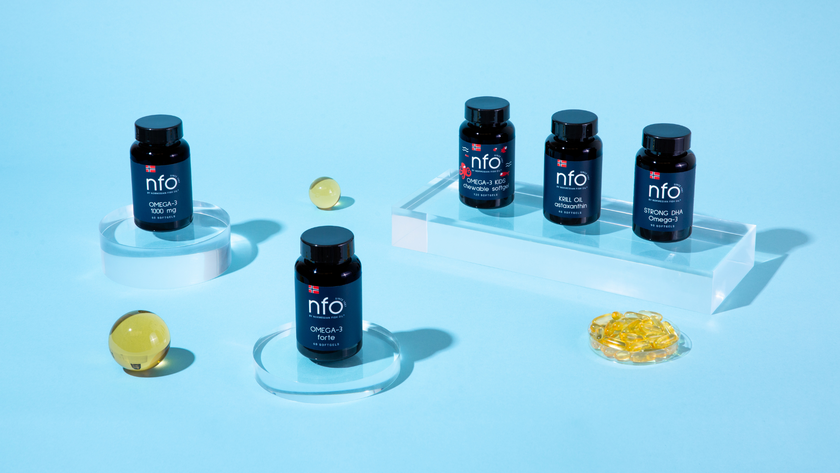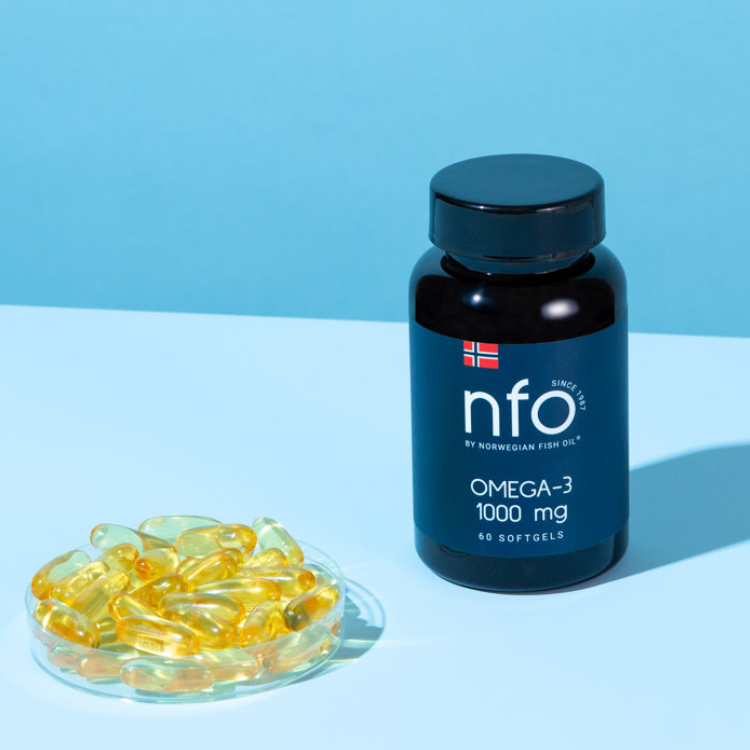يُعدّ زيت السمك وزيت كبد سمك القد من أكثر المكملات الغذائية رواجًا عالميًا. فهما مصدران غنيان بأحماض أوميغا 3 الدهنية، المعروفة بفوائدها الصحية العديدة. ومع ذلك، يختلف هذان الزيتان في تركيبهما واستخداماتهما. إن فهم اختلافاتهما وفوائدهما واستخداماتهما المناسبة يُساعد في اتخاذ خيارات غذائية مدروسة.
أحماض أوميجا 3 الدهنية: حجر الأساس لزيوت الأسماك
يُقدَّر زيت السمك بشكل أساسي لمحتواه العالي من أحماض أوميغا 3 الدهنية، وخاصةً حمضي إيكوسابنتاينويك (EPA) ودوكوساهيكسانويك (DHA). تلعب هذه المركبات دورًا حاسمًا في تقليل الالتهاب، ودعم صحة القلب والأوعية الدموية، والحفاظ على وظائف الدماغ. وكما هو موضح في دراسة ComparED ، فإن حمضي إيكوسابنتاينويك ودوكوساهيكسانويك لهما دورٌ محدد في تعديل مؤشرات الالتهاب في الجسم (Allaire et al., 2016).
ما الذي يميز زيت كبد سمك القد؟
يحتوي زيت كبد سمك القد، المُستخلص من كبد سمك القد، على أحماض أوميغا 3 الدهنية، بالإضافة إلى كميات كبيرة من فيتاميني أ و د. تاريخيًا، استُخدم زيت كبد سمك القد للوقاية من الكساح نظرًا لمحتواه العالي من فيتامين د ( راجاكومار، ٢٠٠٣ ). وهذا يجعله مُكملًا غذائيًا قيّمًا للأفراد المُعرّضين لخطر نقص فيتامين د، وخاصةً في المناطق ذات التعرض المحدود لأشعة الشمس.
الفوائد الصحية لزيت السمك
أكدت دراسات عديدة الفوائد الصحية لزيت السمك، ومنها:
- تخفيف التهاب المفاصل: ثبت أن زيت السمك يُخفف أعراض التهاب المفاصل الروماتويدي، مثل آلام المفاصل وتيبسها. وقد أظهرت دراسة أجراها لاو وآخرون (1993) أن مكملات زيت السمك قد تُقلل من الاعتماد على مضادات الالتهاب غير الستيرويدية (NSAIDs).
- صحة القلب والأوعية الدموية: تدعم أحماض أوميجا 3 الدهنية صحة القلب عن طريق تقليل الدهون الثلاثية وخفض ضغط الدم ( von Schacky et al., 2007 ).
- تعديل المناعة: يمكن لـ EPA و DHA تعديل الاستجابات المناعية، كما هو موضح في دراسة حول تأثيراتهما المثبطة للمناعة ( Virella et al.، 1991 ).
زيت كبد سمك القد: بديل غني بالفيتامينات
على الرغم من أن زيت كبد سمك القد يوفر أيضًا أحماض أوميجا 3 الدهنية، إلا أن ميزته الفريدة تكمن في محتواه العالي من الفيتامينات:
- فيتامين أ: ضروري للرؤية، ووظيفة المناعة، ونمو الخلايا.
- فيتامين د: ضروري لصحة العظام وامتصاص الكالسيوم ( Cleland et al., 2005 ).
ومع ذلك، فمن المهم استهلاك زيت كبد سمك القد باعتدال لتجنب التسمم بفيتامين أ.
إدارة الالتهاب باستخدام أوميغا 3
يُعد الالتهاب أساس العديد من الحالات المزمنة، بما في ذلك التهاب المفاصل وأمراض القلب والأوعية الدموية. تُعد أحماض أوميغا 3 الدهنية الموجودة في زيت السمك عوامل قوية مضادة للالتهابات، حيث تعمل عن طريق تقليل إنتاج السيتوكينات الالتهابية والإيكوسانويدات ( فينتون وآخرون، ٢٠١٤ ).
الاختيار بين زيت السمك وزيت كبد سمك القد
يعتمد الاختيار بين زيت السمك وزيت كبد سمك القد على الاحتياجات الصحية الفردية:
- إذا كان هدفك الأساسي هو تقليل الالتهاب أو دعم صحة القلب، فمن المرجح أن يكون زيت السمك هو الخيار الأفضل بسبب محتواه العالي من EPA وDHA.
- إذا كنت بحاجة إلى فيتامينات إضافية مثل A وD، وخاصة في حالات نقصها، فإن زيت كبد سمك القد هو خيار قيم.
اعتبارات الجرعة والسلامة
يُعد كلٌّ من زيت السمك وزيت كبد سمك القد آمنًا بشكل عام لمعظم الناس عند تناولهما بالجرعات الموصى بها. ومع ذلك، قد يؤدي الإفراط في تناولهما إلى آثار جانبية مثل اضطرابات الجهاز الهضمي، وفي حالة زيت كبد سمك القد، قد يؤدي إلى تسمم فيتامين أ ( كريمر، ٢٠٠٠ ).
خاتمة
زيت السمك وزيت كبد سمك القد مُكمِّلات غذائية فعّالة ذات فوائد صحية مُتنوعة. ورغم تشابههما، إلا أن اختلافاتهما تجعلهما مُناسبتين لمختلف الاحتياجات الصحية. يُمكن لاستشارة أخصائي رعاية صحية أن تُساعدك في تحديد الخيار الأمثل بناءً على أهدافك الصحية الفردية.
مراجع
- ألير، ج. وآخرون (2016). مقارنة عشوائية متقاطعة بين مكملات حمض الإيكوسابنتاينويك وحمض الدوكوساهيكسانويك لتقليل علامات الالتهاب لدى الرجال والنساء: دراسة مقارنة حمض إيكوسابنتاينويك بحمض الدوكوساهيكسانويك (ComparED). مأخوذ من: https://academic.oup.com/ajcn/article/104/2/280/4668547
- كليلاند، إل جي، وآخرون (٢٠٠٥). زيت السمك: ما يحتاج الطبيب إلى معرفته. مأخوذ من https://doi.org/10.1186/ar1876
- فينتون، جي آي، وآخرون (2014). تعديل مناعة أحماض أوميغا 3 الدهنية طويلة السلسلة واحتمالية حدوث آثار صحية سلبية. مأخوذ من: https://www.ncbi.nlm.nih.gov/pmc/articles/PMC3912985
- راجاكومار، ك. (٢٠٠٣). فيتامين د، زيت كبد سمك القد، ضوء الشمس، والكساح: منظور تاريخي. مأخوذ من: https://pediatrics.aappublications.org/content/112/2/e132.long
- فيريلا، ج. وآخرون (1991). التأثيرات المثبطة للمناعة لزيت السمك لدى متطوعين بشريين أصحاء: ارتباطها بالتأثيرات المختبرية لحمض الإيكوسابنتانويك على الخلايا الليمفاوية البشرية. مأخوذ من : https://www.ncbi.nlm.nih.gov/pubmed/1833105
- فون شاكي، س.، وآخرون (٢٠٠٧). فوائد أحماض أوميغا-٣ الدهنية للقلب والأوعية الدموية. مأخوذ من : https://doi.org/10.1016/j.cardiores.2006.08.019
- يمكن الوصول إلى المراجع الأخرى عبر Healthline والمصادر المرتبطة بها.









